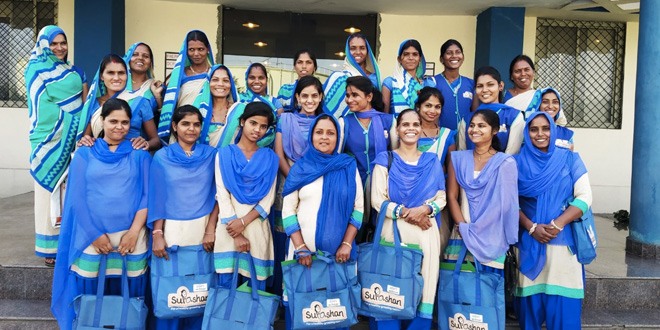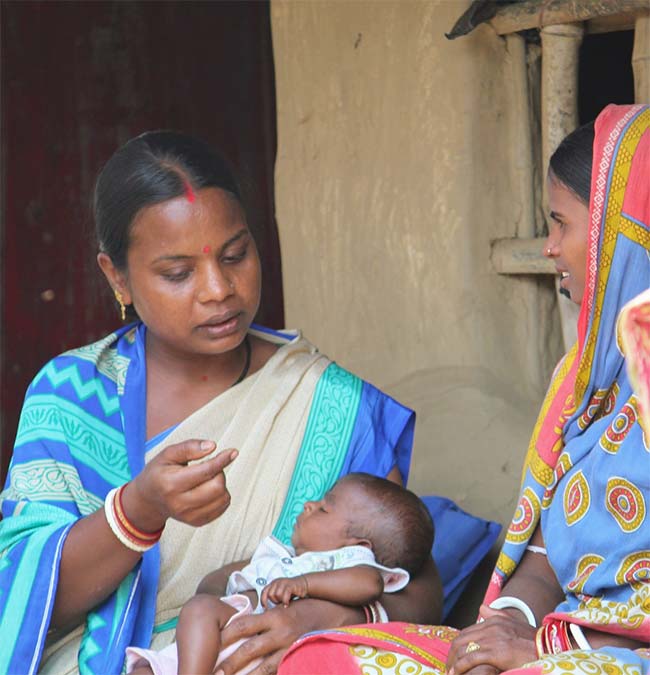Highlights
- SuPoshan Sanginis educate people women and children about nutrition
- They regularly monitor every child’s growth, provide input for improvements
- They assist ASHA and Anganwadi workers in building a healthy nation
New Delhi: The first pregnancy brought both joy and anxiety for Sahajadi Bibiwas from Haldia, West Bengal. Sahajadi had many doubts and queries about the different aspects of pregnancy but was not sure about someone reliable to guide her in this matter. Lack of support from family on seeking regular medical guidance during the tenure of her pregnancy added to her distress. Sahajadi was five months pregnant when SuPoshan Sangini – Tapasi Betal Jana, enrolled her name as a pregnant mother and persuaded her to visit Auxiliary Nurse Midwife (ANM) for a comprehensive check-up. Post-check-up, Sahajadi was found to be anaemic and was advised to take Iron Folic Acid (IFA) as well as consume green and leafy vegetables.
The delay in intervention led to the birth of an underweight baby girl Nusrat (2.1 kgs as opposed to ideal weight of 2.5 kgs to 3.5 kgs). However, SuPoshan Sangini Tapasi Betal Jana continued to guide Sahajadi about the importance of nutritious diet on the health of a mother and child and also other practices like Kangaroo care (holding infant skin to skin). Overtime, Nusrat gained weight and just three months after birth, she weighed 5 kgs. SuPoshan project initiated by Adani Wilmar in October 2016 has a network of 640 SuPoshan Sanginis (women volunteers) spread across 1,440 villages of India who are reiterating the message of right nutrition and helping children escape malnutrition at an early stage.
While Sahajadi found a mentor in SuPoshan Sangini, 20-year-old Beauty Singh from Kishore Prasad village in Odisha got an elder sister. Talking to NDTV about the role of SuPoshan Sangini in her life, Beauty Singh said,
After marriage when I moved to this village, everyone would come home and ask, what have you cooked for your family, what do you do all day. Sangini didi (Sister) was the first person to ask me about me and now my newborn child. During my pregnancy, anganwadi centres were closed due to the Coronavirus pandemic but Sangini didi would call and educate me on feeding practices, cooking and eating habits, vaccinations and other key things.
What Is The Role OF SuPoshan Sanginis?
‘SuPoshan’ started with a mission to reduce the occurrence of malnutrition among children less than 5 years of age and anaemia among adolescent girls (11-19 years of age) and women in reproductive age (19-45 years).
The name ‘Sangini’ comes from the literal translation of the word ‘companion’. SuPoshan Sanginis are women volunteers who support Anganwadi and ASHA workers.
How SuPoshan Sanginis Promote Right Nutrition?
Sanginis play the role of a guide, mentor and guardian. They go door-to-door to collect information like body weight and height of children, and test for Haemoglobin levels of girls and women and identify target groups.
Once a child has been identified, the medically complicated severely malnourished children are referred to the Nutrition Rehabilitation Center (NRC) for treatment. While other malnourished children and anaemic girls and women are treated through community-based interventions like introducing nutritious recipes, kitchen gardens, group meetings and family counselling.
One of the sources of nutrition for children under five years of age and other healthcare services like immunisation is Anganwadi centres. SuPoshan Sanginis like 28-year-old Madhulaxmi Porte, from Janardanpur village in West Bengal make sure that beneficiaries are aware of the services they are entitled to and avail it.
38-year-old Seema Qureshi from Kawai village in Rajasthan who has been working as a Sangini since 2016 briefed us about her work and said,
Initially, we focus on building trust and a relationship with a family and to attain that, we visit them regularly, interact and understand their way of living and accordingly guide. Like, colostrum, the bright yellowish, thick, first milk of the mother is rich in proteins, has anti-infective properties and should be fed to the baby. But elderly women often consider it impure and ask new mothers to discard it. So, we bust such myths.
Further sharing an example of how Sanginis counsel and mentor families on nutrition, 30-year-old Chandrakanti Behera from Kishore Prasad in Odisha said,
Kitchen gardens are a great source of fresh vegetables essential for basic nutrition. We promote the concept of kitchen garden by imparting lessons on how to start one and demonstrate healthy, innovative and nutritious recipes.
Another Sangini, 40-year-old Versha Rangari from Saoner in Maharashtra said that she recommends affordable nutritious food items to a family. She said,
We are rural people and we can’t provide dry fruits and nuts to our children so I suggest alternatives like cow milk, Singdana (peanuts), legumes, and others. Also, we stress on exclusive breastfeeding for the first six months of life as it provides adequate nutrition and protection from diseases.
Sanginis regularly monitor every child’s growth and updates her database. This also helps the family better understand the improvement in their child’s growth. They also use a particular health tablet for data collection and showcase videos to new mothers in order to help gain an understanding of nutritional needs in the local language.
The coronavirus induced lockdown did act as a roadblock for the Sanginis but they continued with their work through tele counselling. With the phased reopening, some Sanginis have started visiting nearby houses like Versha Rangari from Saoner in Maharashtra normally covers three villages. During the lockdown, she could visit only a nearby village where she gave lessons on WASH (water, sanitation and hygiene) practices.
Impact Of SuPoshan Sangini Project
Over 10,000 children have shifted from severe to moderate form of undernutrition. Over 24,000 children have moved from moderately undernourished to healthy category. Also, over 8,000 women have improved Hb levels, informed a spokesperson from Adani Foundation.
Going forward, the team plans to assess and address the impact of COVID-19 on children and their nutritional needs. The long term vision of the project is to create the SuPoshan Sangini as voluntary support for life in villages and local communities.
As a community worker, the SuPoshan Sangini can cater to a population of 3,000 people and is capable enough to counsel and advise people on their nutritional requirements. People can come to her even after the CSR activity stops in a specific location, while we take up new locations, explained a spokesperson from Adani Foundation.
NDTV – Dettol Banega Swasth India campaign is an extension of the five-year-old Banega Swachh India initiative helmed by Campaign Ambassador Amitabh Bachchan. It aims to spread awareness about critical health issues facing the country. In wake of the current COVID-19 pandemic, the need for WASH (Water, Sanitation and Hygiene) is reaffirmed as handwashing is one of the ways to prevent Coronavirus infection and other diseases. The campaign highlights the importance of nutrition and healthcare for women and children to prevent maternal and child mortality, fight malnutrition, stunting, wasting, anaemia and disease prevention through vaccines. Importance of programmes like Public Distribution System (PDS), Mid-day Meal Scheme, POSHAN Abhiyan and the role of Aganwadis and ASHA workers are also covered. Only a Swachh or clean India where toilets are used and open defecation free (ODF) status achieved as part of the Swachh Bharat Abhiyan launched by Prime Minister Narendra Modi in 2014, can eradicate diseases like diahorrea and become a Swasth or healthy India. The campaign will continue to cover issues like air pollution, waste management, plastic ban, manual scavenging and sanitation workers and menstrual hygiene.
[corona_data_new]



































